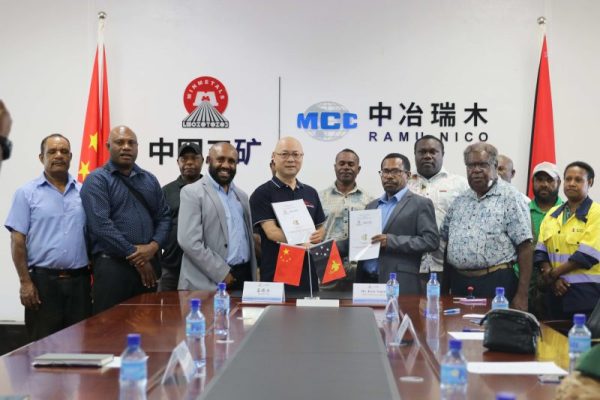In a landmark step toward sustainable community development, Ramu NiCo Management (MCC) Ltd, the developer of Papua New Guinea’s only nickel and cobalt mine in Papua New Guinea, has officially signed a Memorandum of Agreement (MoA) with the PNG Cocoa Board and the Madang Provincial Agriculture Office.
The MoA aims to drive agricultural growth through the establishment and expansion of cocoa programs in the company’s project impact areas.
The signing took place at Ramu NiCo’s Head Office in Madang on the 10th of July 2025 – and marked a collaborative commitment to promote agriculture—particularly cocoa farming—as a viable and sustainable income source for landowners living within the four project corridors of the Ramu NiCo Project.
Under the one-year MoA, the PNG Cocoa Board will provide technical guidance and support to Ramu NiCo’s cocoa nursery project based in Bauri Village, Ward 14 of Astrolabe Bay LLG, Raicoast District. This initiative is spearheaded by the company’s Community Affairs Department and forms part of its broader efforts to empower landowners through agriculture and enterprise development.
Ramu NiCo Vice President, Mr. Meng Deyong, reaffirmed the company’s vision to go beyond mining by investing in initiatives that improve the livelihoods of its landowner communities.
“While our core focus remains on resource extraction, we are equally committed to supporting sustainable livelihood programs. We want our landowners to see agriculture—especially cocoa farming—not just as a supplement, but as a primary source of long-term economic empowerment,” Mr. Meng said.
The cocoa nursery at Bauri Village serves as a seed bank and demonstration site that will supply high-quality cocoa seedlings to farmers across the Ramu NiCo project area. This project is being developed in partnership with the four Landowner Associations and now strengthened through the expertise of the PNG Cocoa Board.
In addition to cocoa, Ramu NiCo has also supported other agriculture-based initiatives such as the Junchao mushroom cultivation and vegetables farming—aimed at promoting small-scale enterprise among rural farmers.
Mr. Meng further stated that the cocoa program will initially focus on the company’s four key impact zones but will eventually be extended to other parts of Madang Province.
“None of this would be possible without the technical leadership and institutional backing of the PNG Cocoa Board. Their involvement ensures that our programs are aligned with national agricultural standards and practices,” he added.
CEO of the PNG Cocoa Board, Mr. Jessy Anjen, welcomed the partnership and praised Ramu NiCo for its proactive stance in integrating agriculture with resource development.
“We are proud to welcome Ramu NiCo into our growing list of partners under the ‘Mining Cocoa’ initiative. This program is designed to turn mining-affected communities into hubs of cocoa production, offering them a sustainable path toward economic resilience,” Mr. Anjen said.
“Ramu NiCo’s commitment to agriculture is commendable and sets a positive example for other resource developers in PNG.”
The MoA represents a strong public-private partnership model that integrates resource development with agriculture, ensuring inclusive growth and lasting benefits for project landowners and surrounding communities.

